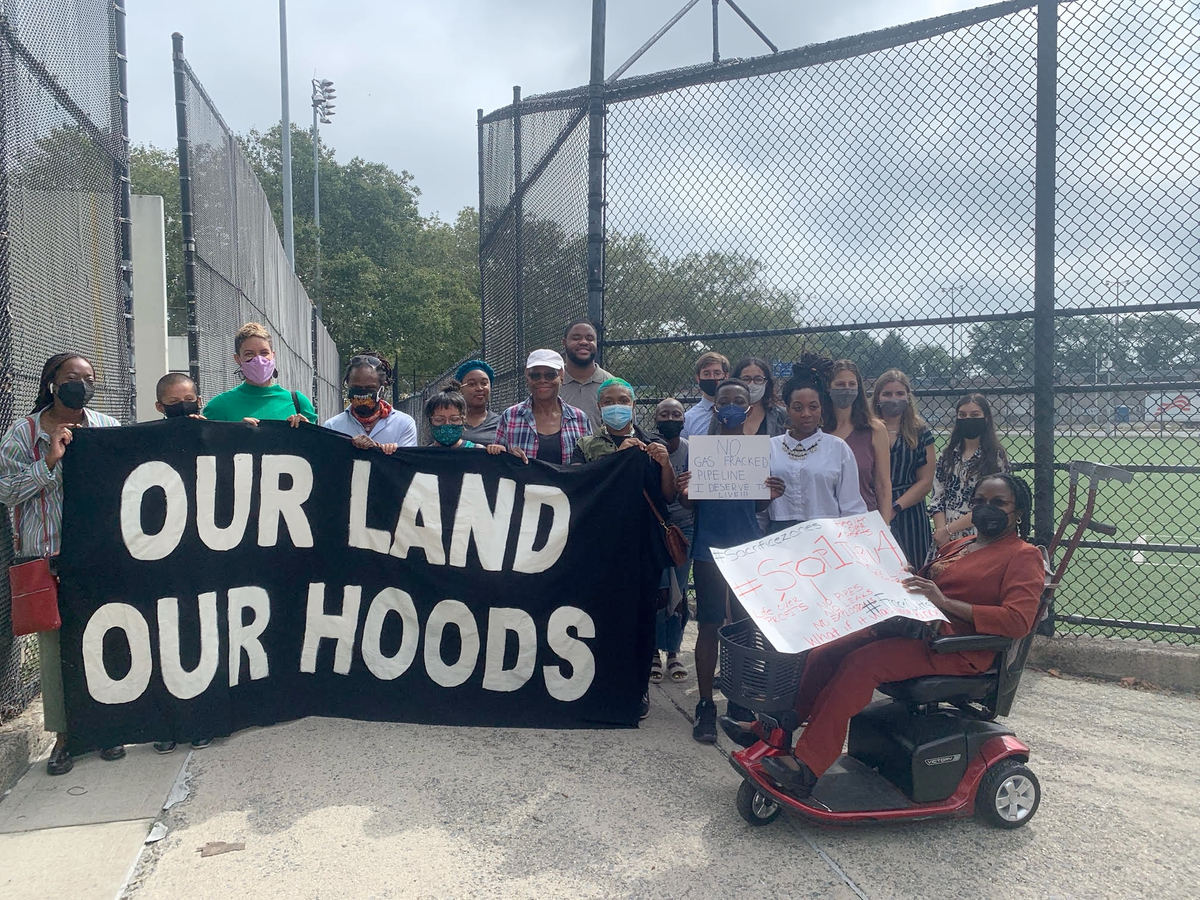Activist Groups Ask Biden Administration to Cut the Gas on Brooklyn Pipeline Project
A coalition of activist groups filed a federal civil rights complaint today that alleges National Grid bypassed key safety and health regulations when constructing a natural gas pipeline in Brooklyn, misleading local residents and ignoring negative health impacts on communities of color.

Activists in Brownsville announcing a legal complaint against National Grid’s North Brooklyn Pipeline. (Image: Doug Cohen)
A coalition of activist groups filed a federal civil rights complaint today that alleges National Grid bypassed key safety and health regulations when constructing a natural gas pipeline in Brooklyn, misleading local residents and ignoring negative health impacts on communities of color.
The letter, which was sent to the Environmental Protection Agency, the Department of Justice and other federal agencies, accuses the utility company of failing to follow required procedures to notify and educate the public about the Metropolitan Natural Gas Reliability Infrastructure (MRI) project, a 7-mile natural gas pipeline that runs through several Brooklyn neighborhoods and is known colloquially as the North Brooklyn Pipeline.
“This pipeline is just another example of how communities of color that have historically borne the burden of environmental racism continue to pay the price,” said Fabian Rogers, a Brownsville resident and a member of Brownsville Green Justice, one of the groups behind the complaint. “The only solution to this current problem is to stop the flow of the gas.”
National Grid, which provides gas service to about 1.8 million customers in Brooklyn, Queens, Staten Island and Long Island, says it built the pipeline to increase the safety, reliability, and flexibility of its system.
But the activists filing the complaint say the pipeline poses a health and environmental risk to communities of color that live along its route, which includes largely Black and Latino neighborhoods like Brownsville and Bushwick. They say many residents only learned about the project “after dangerous and toxic fracked gas was already flowing underneath their homes.”
National Grid, they allege, failed to perform required pressure tests that would identify the potential for dangerous leaks, and say the utility did not submit important information to regulators.
They also accuse the state agencies tasked with overseeing the project—the Department of Environmental Conservation and the Department of Public Service (DPS)—of ignoring or failing to identify the violations. And they say state law required National Grid to seek approval from the City Council for the pipeline route before starting construction, which the utility did not do.
The filing was submitted by Brownsville Green Justice, the Ocean Hill-Brownsville Coalition of Young Professionals, Mi Casa Resiste and the Indigenous Kinship Collective. The activist groups are represented by the New York Law School Civil Rights and Disability Justice Clinic and the National Center for Law and Economic Justice.
The groups argue that the pipeline’s construction violates Title VI of the Civil Rights Act of 1964, which bars entities that receive federal funding from engaging in racial discrimination. And they’re asking President Joe Biden to shut off the gas.
“We need the federal government to support their efforts by conducting a full investigation into what happened here and stopping this entire pipeline once and for all,” said Professor Britney Wilson, an attorney at New York Law School.
In a statement provided to Bklyner, National Grid said all work on the pipeline was conducted with required approvals in place and was fully compliant with relevant laws and regulations.
“MRI was designed to help efficiently operate a distribution system that is vital to meeting the critical energy needs of our 1.9 million customers downstate safely and reliably,” said Wendy Ladd, a spokesperson for the organization.
“The project provides an additional loop within the existing gas network that services all of Brooklyn to improve system reliability, operational flexibility, and redundancy," Ladds said. "National Grid maintains over 4,100 miles of infrastructure within our service territory in neighborhoods throughout New York City to serve all our customers. MRI is part of that large system.”
For years, environmental and community activists who have pushed National Grid to abandon the pipeline in favor of investments in cleaner heat sources, organized rallies, lock-ups, and lawsuits in an attempt to stop the project. Opposition has also come from city and state elected officials, including Mayor Bill de Blasio.
The pipeline was built in several phases between 2017 and 2020. Earlier this month, the state’s Public Service Commission halted construction of a fifth and final phase set to run through Greenpoint and required National Grid to meet metrics on reducing energy demand before attempting to restart it.
The ruling nevertheless infuriated activists, because it permitted National Grid to use approximately $129 million of the revenue generated by new rate hikes to pay costs incurred during the already completed portions of the project.





